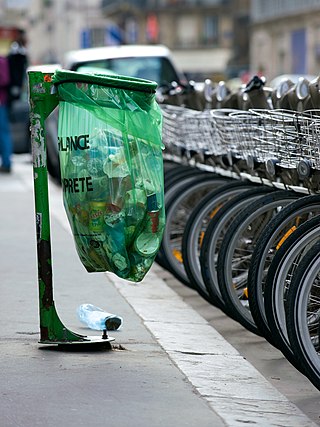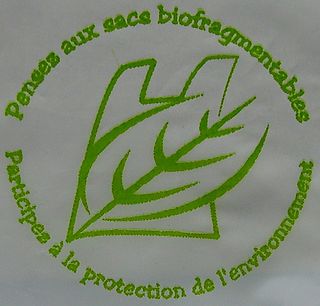Related Research Articles

American Chemistry Council (ACC), known as the Manufacturing Chemists' Association at its founding in 1872 then as the Chemical Manufacturers' Association, is an industry trade association for American chemical companies, based in Washington, D.C.

Plastic shopping bags, carrier bags, or plastic grocery bags are a type of plastic bag used as shopping bags and made from various kinds of plastic. In use by consumers worldwide since the 1960s, these bags are sometimes called single-use bags, referring to carrying items from a store to a home. However, it is rare for bags to be worn out after single use and in the past some retailers incentivised customers to reuse 'single use' bags by offering loyalty points to those doing so. Even after they are no longer used for shopping, reuse of these bags for storage or trash is common, and modern plastic shopping bags are increasingly recyclable or compostable - at the Co-op for example. In recent decades, numerous countries have introduced legislation restricting the provision of plastic bags, in a bid to reduce littering and plastic pollution.

A plastic bag, poly bag, or pouch is a type of container made of thin, flexible, plastic film, nonwoven fabric, or plastic textile. Plastic bags are used for containing and transporting goods such as foods, produce, powders, ice, magazines, chemicals, and waste. It is a common form of packaging.

A disposable is a product designed for a single use after which it is recycled or is disposed as solid waste. The term is also sometimes used for products that may last several months to distinguish from similar products that last indefinitely. The word "disposables" is not to be confused with the word "consumables", which is widely used in the mechanical world. For example, welders consider welding rods, tips, nozzles, gas, etc. to be "consumables", as they last only a certain amount of time before needing to be replaced. Consumables are needed for a process to take place, such as inks for printing and welding rods for welding, while disposable products are items that can be discarded after they become damaged or are no longer useful.
Polyethylene or polythene film biodegrades naturally, albeit over a long period of time. Methods are available to make it more degradable under certain conditions of sunlight, moisture, oxygen, and composting and enhancement of biodegradation by reducing the hydrophobic polymer and increasing hydrophilic properties.

A milk bag is a plastic bag that contains milk. Usually one of the corners is cut off to allow for pouring, and the bag is stored in a pitcher or jug.

A reusable shopping bag, sometimes called a bag for life in the UK, is a type of shopping bag which can be reused many times, in contrast to single-use paper or plastic shopping bags. It is often a tote bag made from fabric such as canvas, natural fibres such as jute, woven synthetic fibers, or a thick plastic that is more durable than disposable plastic bags, allowing multiple use. Other shoppers may use a string bag or a wheeled trolley bag. They are often sold in supermarkets and apparel shops.

Biodegradable bags are bags that are capable of being decomposed by bacteria or other living organisms.
A plastic bag ban or charge is a law that restricts the use of lightweight plastic bags at retail establishments. In the early 21st century, there has been a global trend towards the phase-out of lightweight plastic bags. Single-use plastic shopping bags, commonly made from low-density polyethylene (LDPE) plastic, have traditionally been given for free to customers by stores when purchasing goods: the bags have long been considered a convenient, cheap, and hygienic way of transporting items. Problems associated with plastic bags include use of non-renewable resources, difficulties during disposal, and environmental impacts. Concurrently with the reduction in lightweight plastic bags, shops have introduced reusable shopping bags.

Plastic pollution is the accumulation of plastic objects and particles in the Earth's environment that adversely affects humans, wildlife and their habitat. Plastics that act as pollutants are categorized by size into micro-, meso-, or macro debris. Plastics are inexpensive and durable, making them very adaptable for different uses; as a result, manufacturers choose to use plastic over other materials. However, the chemical structure of most plastics renders them resistant to many natural processes of degradation and as a result they are slow to degrade. Together, these two factors allow large volumes of plastic to enter the environment as mismanaged waste which persists in the ecosystem and travels throughout food webs.

Lit for Life is an annual literary festival organised by the English daily The Hindu in Chennai, India. The festival was inaugurated in 2010, where it was part of the celebration of the 20th anniversary of The Hindu's Literary Review. In 2011 the Lit for Life became an independent one-day event. It has over the years developed into a three-day festival of literature and thought, featuring notable authors and speakers from all over the world. In 2020, the festival, that always takes place in mid-January, will celebrate its 10th anniversary. Main initiator and organiser of the Lit for Life is Dr Nirmala Lakshman, Director of The Hindu Group of Publications, and Chairperson of the Board of The Hindu Tamil.
There are various issues of waste management in Thailand, including excessive plastic use, industrial waste, among others.

Proposition 67 was a California ballot proposition on the November 8, 2016 ballot. A "Yes" vote was to approve, and a "No" vote to reject, a statute that prohibits grocery and other stores from providing customers single–use plastic or paper carryout bags but permits the sale of recycled paper bags and reusable bags for a fee.
The Plastic Pollution Coalition (PPC) is an advocacy group and social movement organization which seeks to reduce plastic pollution. PPC operates under the fiscal sponsorship of the umbrella organization Earth Island Institute.
Plastic bag bans in Australia were implemented in the early 21st century by the country’s states and territories, rather than through federal law. The intent of the bans is to help reduce the amount of plastic pollution in the environment, both in and around Australia and globally.

Packaging waste, the part of the waste that consists of packaging and packaging material, is a major part of the total global waste, and the major part of the packaging waste consists of single-use plastic food packaging, a hallmark of throwaway culture. Notable examples for which the need for regulation was recognized early, are "containers of liquids for human consumption", i.e. plastic bottles and the like. In Europe, the Germans top the list of packaging waste producers with more than 220 kilos of packaging per capita.

There is no national plastic bag fee or ban currently in effect in the United States. However, the states of California, Colorado, Connecticut, Delaware, Hawaii, Maine, New Jersey, New York, Oregon, Rhode Island, Vermont and Washington and the territories of American Samoa, Guam, Northern Mariana Islands, United States Virgin Islands and Puerto Rico have banned disposable bags. Over 200 counties and municipalities have enacted ordinances either imposing a fee on plastic bags or banning them outright, including all counties in Hawaii.
China's waste import ban, instated at the end of 2017, prevented foreign inflows of waste products. Starting in early 2018, the government of China, under Operation National Sword, banned the import of several types of waste, including plastics with a contamination level of above 0.05 percent. The ban has greatly affected recycling industries worldwide, as China had been the world's largest importer of waste plastics and processed hard-to-recycle plastics for other countries, especially in the West.

In the late 20th and early 21st century, there has been a global movement towards the phase-out of polystyrene foam as a single use plastic (SUP). Early bans of polystyrene foam intended to eliminate ozone-depleting chlorofluorocarbons (CFCs), formerly a major component.
Plastic bans are laws that prohibit the use of polymers manufactured from petroleum or other fossil fuels, given the pollution and threat to biodiversity that they cause. A growing number of countries have instituted plastic bag bans, and a ban on single-use plastic, and are looking to spread bans to all plastic packaging, plastic clothing (such as polyester and acrylic fiber, or any other form of unnecessary plastic that could be replaced with an easily biodegradeable, non-fossil-fuel or non-polluting alternative. Plastics biodegrade over a long period of time, and may not biodegrade fully leaving traces of microplastics, ranging from 450 years for a PET plastic bottle to thousands "never" for polypropylene-based products, including food containers.
References
- ↑ "Plastic bags have lobbyists. And they're still winning". Politico. 2020-01-13.
- ↑ "ACC, SPI Align and Expand Efforts to Defend Plastic Bags and Increase Plastic Film Recycling". americanchemistry.com. 2017-07-21. Archived from the original on 2017-07-21. Retrieved 2023-05-03.
- ↑ "American Progressive Bag Alliance becomes American Recyclable Plastic Bag Alliance". Recycling Today. Retrieved 2020-04-02.
- ↑ Foster, Rick. "Plastic peril? Concerns about single-use shopping bags prompts local, state proposals to ban them". The Sun Chronicle. Retrieved January 27, 2019.
- ↑ "The biggest war on plastic is in New Jersey and bags, straws may not survive". North Jersey. Retrieved January 27, 2019.
- ↑ O'Connor, Katie. "Another push for a plastic bag tax in Virginia dies". virginiamercury.com. Retrieved January 27, 2019.
- ↑ Jeff Guo (2015-03-03). "A plastic bag lobby exists, and it's surprisingly tough". The Washington Post . Washington, D.C. ISSN 0190-8286. OCLC 1330888409.